The Cellar under the Rams
6.18

Overview
The "Piwnica pod Baranami" cabaret was founded in 1956 by Piotr Skrzynecki and a group of students in the cellars of the Kraków palace "Pod Baranami." From the very beginning, it became an important meeting place for artists and students, distinguished by its unique atmosphere and interior architecture that fostered creative expression. Among the founders were Bronisław Chromy and Krzysztof Penderecki, with Janina Garycka serving as the literary director, who significantly influenced the cabaret's development. In the 1960s and 1970s, Piwnica gained nationwide recognition, promoting artists such as Ewa Demarczyk, Leszek Długosz, and Marek Grechuta. Their performances featured texts on a variety of themes—from poetry to absurd dialogues. After 1976, Piwnica underwent personnel changes, welcoming new talents who continued to shape its image. Following Skrzynecki's death in 1997, the team decided to continue the tradition, with Marek Pacuła taking over as artistic director. In 2010, after a conflict, further transformations occurred in the management. Piwnica was also a hub for collaboration with the jazz world, attracting renowned musicians such as Krzysztof Komeda and Tomasz Stańko. The Jazz Festival at Piwnica, held since 1996, became an important event in Kraków's cultural calendar. The interiors of Piwnica pod Baranami, with their unique atmosphere, and its history pulsating with artistic life, represent a thoughtful architectural project that combines various aspects of Polish culture, from jazz to poetry. It is worth noting that in the past, artists were subject to denunciations, reflecting the political climate of the Polish People's Republic; this information has been documented in research works on the activities of the secret police. Piwnica pod Baranami not only contributed to the development of local culture and art but also became part of Poland's national history and artistic phenomena, creating a unique space for future generations of artists.
Location
Tickets
Powered by GetYourGuide
2026 Wizytor | All Rights Reserved